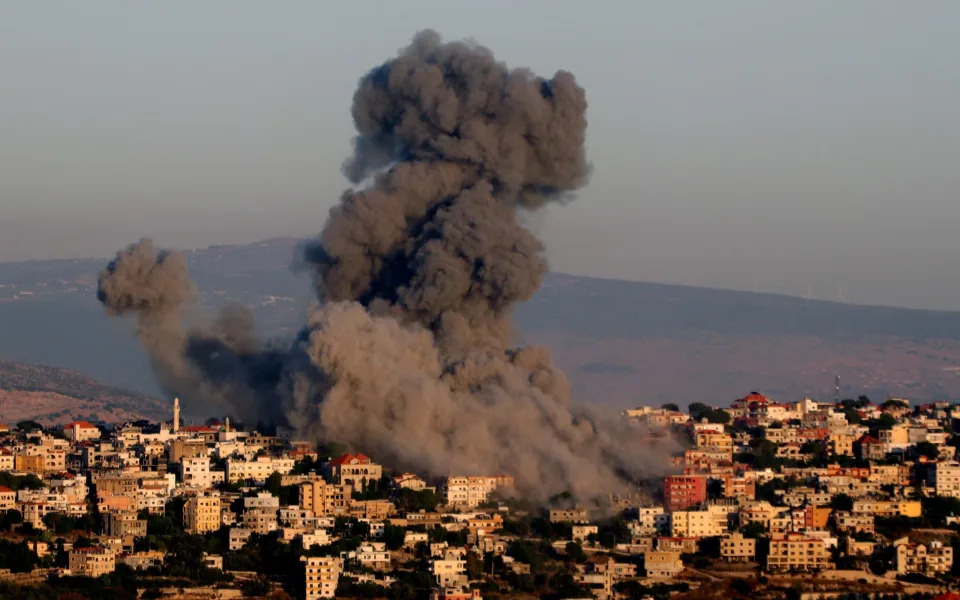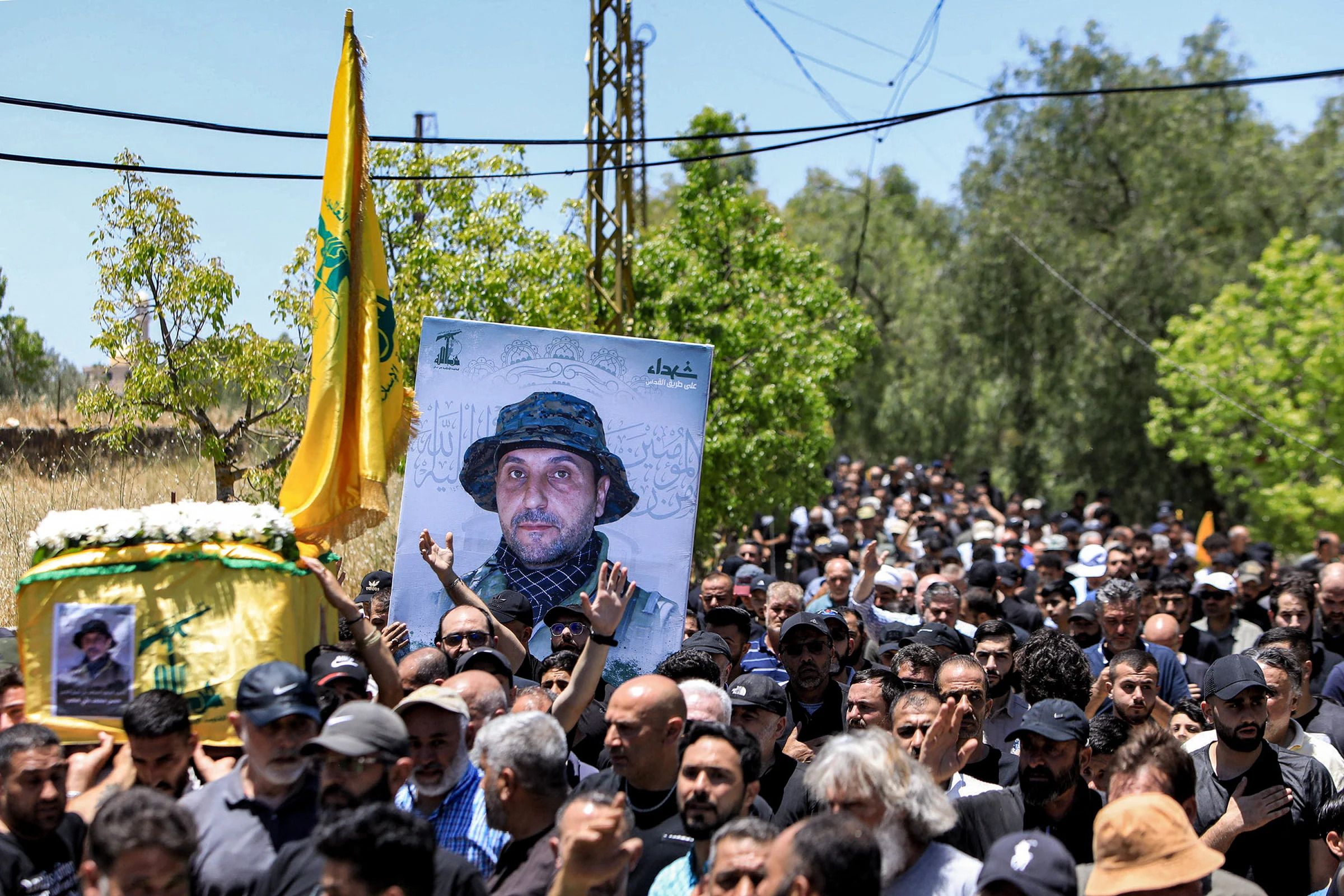A large-scale conflict between Israel and Hezbollah could break out in a matter of weeks if Gaza truce talks fail to produce a ceasefire, US intelligence suggests.
The IDF and Hezbollah are both rushing to build up their stockpiles of weapons, two US officials who had been briefed on the intelligence told Politico.
The officials said they were not confident that fraught ceasefire talks between Israel and Hamas would bear fruit in the near future, raising the risk of a wider conflict with Hezbollah.
Fears of a wider regional war have been growing in recent weeks as Iran-backed Hezbollah and the Israel Defense Forces (IDF) have traded fire with increasing frequency, forcing tens of thousands of civilians to flee from both sides of the border.
Israel has killed at least 481 people in Lebanon since the Hamas attacks of Oct 7, including 94 civilians, reported AFP. On the Israeli side, at least 15 soldiers and 11 civilians have died, according to Israel.
Hezbollah has vowed to continue its volley of rockets, anti-tank missiles and explosive drones unless Israel ends the war in Gaza.
Yoav Gallant, Israel’s defence minister has warned that the military is capable of taking Lebanon “back to the Stone Age”.

However, he insisted that the Israeli government preferred to find a diplomatic solution to ongoing hostilities between its forces and the Lebanon-based Hezbollah terror group.
“We don’t want to get into a war because it’s not good for Israel. We have the ability to take Lebanon back to the Stone Age, but we don’t want to do it,” Mr Gallant told reporters during a visit to Washington this week to meet senior US leaders.
His threat was the latest in a series of statements from senior public figures about Israel’s waning patience over Hezbollah attacks.
“We can plunge Lebanon completely into the dark and take apart Hezbollah’s power in days,” Benny Gantz, a former Israeli war cabinet member, said on Tuesday during a conference in Herzliya.
Hassan Nasrallah, Hezbollah’s leader, warned Israel of the consequences of escalation, declaring in a televised address from Beirut earlier this month that “no place in [Israel] is safe from our rockets”.
The United States has stepped up its efforts to curtail the border clashes and avert a wider crisis.
But a US-backed ceasefire deal for the Gaza Strip remains elusive, with Hamas, the terror group, still demanding a guarantee from Israel that it will withdraw its troops and immediately end the war.
In his first Israeli media interview since the start of the war, Benjamin Netanyahu, the Israeli prime minister, said on Sunday the “intense phase” of fighting Hamas in Gaza was nearly over, which would free more forces to reposition themselves to defend the north.

But he stressed that this “doesn’t mean the war is about to end” in Gaza and said Israel would continue to try to remove Hamas from power. He insisted that Israel was capable of fighting on several fronts.
As political leaders struggle to find a diplomatic resolution to the tensions, aid chiefs have warned a deeper conflict would have a dire impact on civilians.
The spillage of the Israeli war in Gaza to Lebanon could be “potentially apocalyptic”, said Martin Griffiths, the UN under-secretary for humanitarian affairs and emergency relief coordinator.
This week, Germany and the Netherlands joined several other countries in urging their citizens based in Lebanon to leave while they still could.
“Tensions in the border areas with Israel are heightened and could escalate further at any time,” the German foreign office said, shortly after Annalena Baerbock, the foreign minister, visited Israel and Beirut.
The Dutch foreign ministry also warned that Lebanon was “unsafe” and “the situation remains very unpredictable.”
The UK’s foreign office advice, last updated on April 26, advises against all travel to Lebanon and encourages citizens living there to leave while commercial options remain available.
AfriPrime App link: FREE to download...
https://www.amazon.com/Africircle-AfriPrime/dp/B0D2M3F2JT
An Israel-Hezbollah war could be in the making
As the Israel-Hamas war is supposedly entering a new phase of more targeted raids in Gaza, another war is raging along the Israel-Lebanon border.
Since Hamas’ Oct. 7 assault in southern Israel, the Israeli military and Hezbollah have engaged in deadly clashes in the border area. Israel said it has struck thousands of Hezbollah targets throughout Lebanon, killing at least 300 Hezbollah fighters.
According to the Israeli military, Hezbollah has fired more than 5,000 rockets, drones and missiles into northern Israel, killing Israeli civilians and troops and forcing tens of thousands of Israelis to leave their homes.
The danger in this conflict shouldn’t be understated. Israeli Prime Minister Benjamin Netanyahu could conclude at some point that large-scale military action is required to push Hezbollah from its borders. During a June 5 visit to the northern Israeli town of Kiryat Shmona, Netanyahu emphasized that security will be restored to the north sooner or later. Plans for a large-scale Israeli operation against Hezbollah have reportedly been approved, which means the only thing standing in the way of another war in Lebanon is a political decision by Netanyahu.
For months, the Israel-Hezbollah tit-for-tat was confined to within 5 or 6 miles of the Blue Line, the United Nations-demarcated border between Israel and Lebanon. But the scope of hostilities is getting wider. It’s no longer rare for Israeli airstrikes to hit deep into Lebanon’s interior.
On June 10, Israel conducted its deepest strike in Lebanon yet, hitting a Hezbollah facility in the Baalbek region. Israel killed Hezbollah field commander Taleb Abdallah the next day, which prompted Hezbollah to retaliate with hundreds of rockets into northern Israel. Hezbollah is employing more sophisticated weapons to pierce Israeli air defenses.
Israeli military operations in Lebanon have a long history, with the military taking action in 1978 and 1982 against the Palestine Liberation Organization and in 1993, 1996 and 2006 against Hezbollah. None of those operations was especially successful. Israel’s 1982 invasion forced PLO leader Yasser Arafat to Tunisia but also resulted in an 18-year occupation of southern Lebanon that arguably produced Hezbollah. The 1993 and 1996 air campaigns were at best tactical successes. The 2006 war hit Hezbollah hard and restored deterrence along the border, but the Lebanese group quickly reconstituted its military power courtesy of Iranian assistance.
It’s difficult to see another large-scale Israeli invasion of Lebanon succeeding where others failed. Hezbollah is no longer an insurgency with limited reach — it’s the dominant political faction in Lebanese politics, and its military wing is larger than the official Lebanese army. Hezbollah’s arsenal, complete with as many as 200,000 missiles, attack drones, intelligence, surveillance and reconnaissance platforms and Iranian-supplied precision munitions, would all be used in a war with Israel. Israeli cities and towns far beyond the border region would sustain extensive damage. Hezbollah’s missiles can hit all of Israel, and the group has enough of them to confuse Israeli air defense systems.
President Joe Biden’s administration clearly understands just how destabilizing a war in Lebanon would be. U.S. officials have reportedly told their Israeli counterparts that a limited war against Hezbollah would likely force Iran, Hezbollah’s primary sponsor, to become more involved.
The U.S. has tried to broker a deal that would at least deescalate the situation. Amos Hochstein, Biden’s special envoy, engaged in another round of shuttle diplomacy with Israeli and Lebanese officials last week. But his efforts have been unsuccessful thus far. Hezbollah insists no diplomatic arrangement is possible until Israel ends the war in Gaza.
There is an agreement in sight, but both sides need to ditch maximalism to make room for common sense.
Israel wants Hezbollah to withdraw north of the Litani River, roughly 20 miles away from the Israel-Lebanon border. Yet it’s difficult to envision Hezbollah acceding to this demand since this would force the group to vacate its main base of support. However, depending on what Israel offers in return, Hezbollah could conceivably withdraw 6 or 7 miles from the Israeli border. This won’t satisfy the hard-liners in Israel, but it’s better than the current arrangement in which northern Israel is written off as a de facto military zone devoid of civilians.
To make these terms palatable to the Israelis, the U.N. peacekeeping mission in Lebanon could verify the pullback and the Lebanese army could be redeployed to areas vacated by Hezbollah to ensure the militia doesn’t renege.
Israel, of course, won’t get this concession for free. While no Israeli prime minister would agree to limit Israel’s ability to act in self-defense — nor should they — Israel could stop daily incursions into Lebanese airspace or at least limit them to an agreed-upon number. Israeli ground troops would need to withdraw from the small pockets of Lebanese territory they still occupy in contravention of U.N. Security Council resolutions. Assuming all of this succeeds — admittedly a big assumption — Israel and the Lebanese state could then get on with the task of negotiating a permanent border.
In the interim, the Biden administration must get brutally honest with its friends in Israel: Not only would the U.S. not join a war in Lebanon, but it also would oppose it on principle. Israel must be under no illusions that the U.S. would bail it out in the event the Israeli government initiates a large-scale offensive.
A good-enough diplomatic resolution, even if it’s a placeholder, is preferable to a war that would cause immense suffering in the region, undermine U.S. policy objectives in the Middle East, and draw the U.S. and Iran into a direct conflict neither wishes to fight.
AfriPrime App link: FREE to download...



